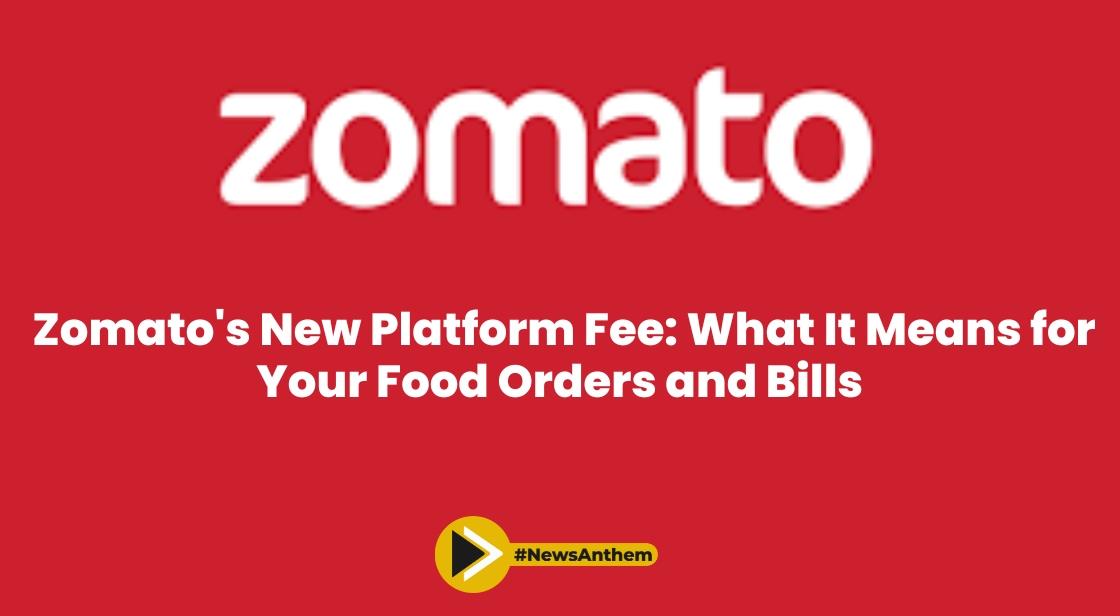Zomato's New Platform Fee: What It Means for Your Food Orders and Bills

News Synopsis
Zomato's Experiment with Platform Fees
Zomato, a prominent player in the food delivery industry, has initiated a trial phase of a Rs 2 platform fee per order in select markets. This fee, applicable to all users including Zomato Gold members, is part of the company's efforts to explore avenues for profitability enhancement and enhance the overall user experience.
Testing the Waters: Zomato's Platform Fee in Detail
The platform fee, currently in its experimental stage, has garnered attention as it is imposed irrespective of the order's cart value. While the fee is under trial and not yet implemented universally, Zomato's decision to levy an extra charge has raised questions about its potential impact on consumers and the platform's financial health.
The Motivation Behind Platform Fees: Zomato's Profitability Strategy
Zomato recently reported its first-ever consolidated profit of Rs 2 crore in the April-June quarter, a promising sign for the company's financial trajectory. However, the quarter also witnessed a surge in total expenses from Rs 1,768 crore to Rs 2,612 crore. This surge underscores the company's continued need to explore avenues for reducing expenses in order to achieve sustainable long-term profitability.
Understanding Zomato's CFO Perspective
While Zomato's Chief Financial Officer (CFO), Akshant Goyal, initially stated that the company had not reached a decision about the implementation of platform fees, recent developments indicate a shift in this stance. The decision to introduce a nominal fee on a trial basis reflects the company's ongoing commitment to balancing its financial equation while delivering value to its user base.
User Experience and Long-Term Viability: Zomato's Balancing Act
The platform fee's introduction aligns with Zomato's goal of augmenting profitability and optimizing its business model. The company plans to evaluate the results of the trial and gather user feedback before making any long-term decisions about the fee structure. This cautious approach emphasizes the importance of maintaining a positive user experience while navigating the dynamics of revenue generation.
About Zomato: Navigating the Culinary Landscape
Founded in 2008 by Deepinder Goyal and Pankaj Chaddah, Zomato emerged as a pioneering restaurant discovery and food delivery platform. Originally known as Foodiebay, the platform was rebranded as Zomato in 2010. Beyond offering menu details, reviews, and images of restaurants, Zomato allows users to place food orders online, reserve tables, and manage their dining experiences. As a multifaceted technology platform, Zomato caters to the diverse needs of customers, restaurant partners, and delivery partners through services that span:
1. Searching and Discovering Restaurants: Navigating Culinary Choices
2. Customer-Generated Reviews and Visuals: Insights and Imagery
-
Food Delivery Services: Culinary Convenience at Your Doorstep
-
Table Reservations: Enhancing Dining Experiences
-
Seamless Payments: Streamlining Transactions
Conclusion: Navigating Innovation and Sustainability
Zomato's experimentation with platform fees illuminates the intricate balance that technology-driven businesses must maintain between profitability and user satisfaction.
This step underscores the evolving landscape of the food delivery sector, where innovation and financial sustainability converge.
As the platform assesses the results of its fee trial, it stands as a testament to the company's determination to adapt, innovate, and continually refine its offerings for the benefit of both users and the business itself.
You May Like









